Wilson, an organizational leadership major, recently returned from Washington D.C., where he was advocating Congress with fellow veterans affiliated with the advocacy nonprofit High Ground.
“They provide you with the ability to negotiate and get the message out there in a succinct manner,” said Wilson.
He and his colleagues advocated for an expansion of the Transition Assistance Program. Wilson is particularly interested in changing the transition process so that veterans are more familiar with all the college options available to them.
“I found my way to Fordham through an alumnus; he was my unit commander at West Point where I was stationed,” said Wilson. “He just planted the seed in my head, but I did the rest.”
Wilson said he went online and used the GI Bill Comparison Tool and found that as a Yellow Ribbon school Fordham has very competitive rates for veterans. Given West Point’s proximity to New York City, he was able to easily visit the Rose Hill campus as well. But aside from commanders, no one from the military had encouraged him to apply to a prestigious institution.
“There’s a stigma among some of us vets that we can’t be successful at a top-tier university,” he said. “The problem within the military is we’re not informed about our options.”
As a result, he said, many veterans simply apply to community colleges or fall victim to predatory for-profit schools.
“A lot of this comes from the fact that education is viewed by some vets as promotion points or just a piece of paper,” he said. “It has made us uninformed consumers of education.”
He said the responsibility of making veterans aware of their options falls not just on the military, but also to the colleges.
Wilson said he’ll be running for a leadership role at the Fordham Veterans Association next year. Right now, the group is focusing on better integration among veterans and the traditional student population, an initiative which he supports. In the future, he wants to help inform veterans know that Fordham and its peer institutions are for them.

